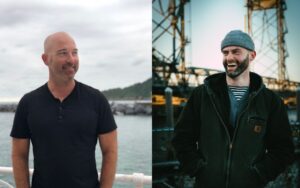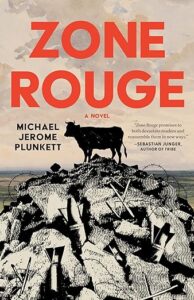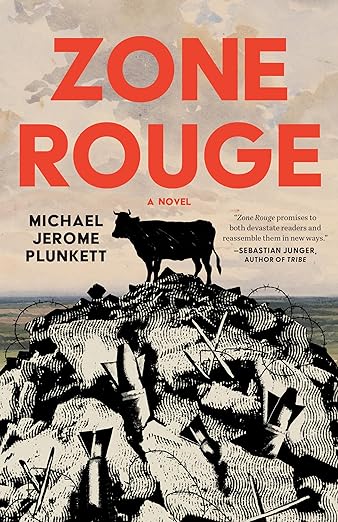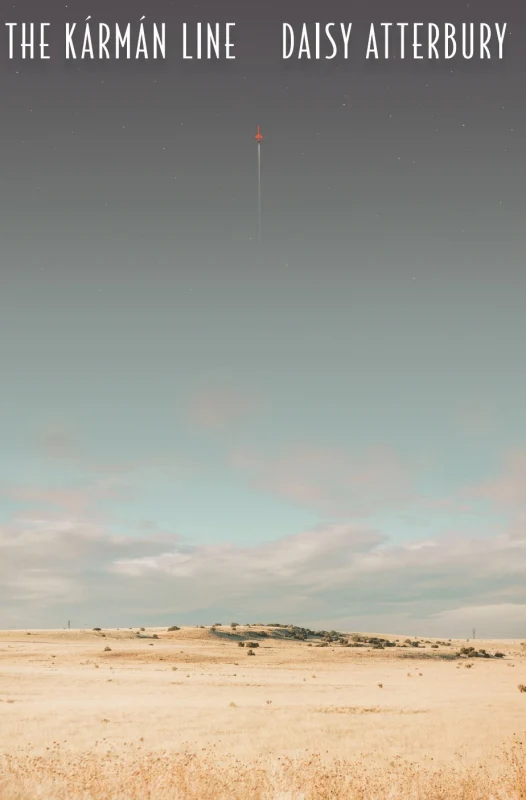In this interview, JULIAN ZABALBEASCOA and MICHAEL JAMES PLUNKETT explore how a chance visit to the World War I battle site of Verdun sparked a decades-long journey that led to Plunkett writing Zone Rouge. Their conversation took place across time zones as Zalbalbeascoa was in Donostia-San Sebastian, Spain, and Plunkett was home in Columbus, Ohio, having just welcomed his second child. In their correspondence, they cover makeshift writing rituals from Morgan Stanley’s cafeteria to subway rides, the joys of publishing with independent presses, the art of dodging probable plot twists, resilience in the face of climate change, and “fiction’s ability to explore the human condition in ways data can’t.”

Julian Zabalbeascoa (Left) and Michael Jerome Plunkett (Right)
Julian Zalbalbeascoa (JZ): Since The Common is a journal that celebrates how place functions in our lives, I thought we’d begin with the setting of your novel: Verdun, site of the decisive battle in World War I, which resulted in the deaths of over 300,000 French and German soldiers. When did your interest in Verdun (the place and the battle) begin? And when did you think to yourself, There may be a novel here.
Michael Jerome Plunkett (MJP): In the summer of 2013, I took a train from Luxembourg to Paris and stopped in Verdun, hoping to quickly check the box on seeing a World War I battlefield. I’d grown up fascinated by military history (especially the American Civil War), but nothing prepared me for Verdun. The land itself had been reshaped by artillery. Signs warned not to stray off paths due to unexploded ordnance still buried beneath the soil. And we’re talking over a century later. I thought it might be a scare tactic, but it wasn’t. The French government still employs démineurs (EOD techs) to clear the land.
The visit stuck with me. I went home and fell down the rabbit hole. This wasn’t just Verdun or WWI, but a global legacy of war: land that remains dangerous long after peace is declared. I tried to write about it, but I didn’t yet have a way in.
Years later, while transferring units in the Marine Corps, I kept noticing the strange dissonance between the bureaucratic language of my written orders and the very human Marines drafting them. That tension—between voice and duty, between past and present—helped me imagine the men doing the cleanup in Verdun. I started writing fake reports. Then the reports became a story. Then the story became a novel.
JZ: I can’t imagine the depths of that rabbit hole. Reading Zone Rouge, I’d have put money on you having spent no less than a decade as a démineur. You render their work so thoroughly, both in an objective and subjective sense. What did research look like for you? And what was the process of transubstantiating that into fiction?

MJP: It’s funny, when I started writing Zone Rouge, I actually avoided most primary sources. Beyond basic facts about Verdun, I didn’t want the history to overtake the humanity. I was writing about people who live there now—people raising kids, dealing with failing marriages, planning their next vacation. They’re not walking around thinking about myth and memory. They’re just living.
Since I’m not French and had only visited Verdun twice, I wrote from what I knew. My years as an EMT in South Carolina helped. I knew that those long stretches of boredom interrupted by brief, brutal intensity felt familiar. That rhythm informed the novel more than any archive could.
Some people asked why I didn’t just write nonfiction. The truth? I don’t have the resources or the chops for that. But more than that, I believe in fiction’s ability to explore the human condition in ways data can’t. What does it mean to spend your life cleaning up someone else’s war, knowing you’ll never finish, never be thanked, never have a “mission accomplished” moment? That’s what the book is really about—not just what happened, but what it feels like to live with it every day.
JZ: It also seems to be about two epochs’ existential battles. For those over 100 years ago in Verdun, the fate of your country was determined by war at one of its most cruel and fevered pitches. For us today, climate change. Can you speak on the various environmental concerns at the heart of this novel?
MJP: When I began researching Verdun, environmental damage immediately caught my attention. The chemicals from unexploded ordnance are pervasive, leaching into soil, plants, and wildlife. Initially intrigued by explosives that might still detonate under a farmer’s plow, I soon realized chemical contamination posed a far deeper threat. Despite this, I consciously resisted hopelessness, recognizing that pessimism was personally untenable, even dangerous for my mental health.
Instead, I sought examples of human creativity and resilience. Organizations like the forestry service actively rehabilitate this scarred land, transforming death back into life. For instance, during my 2023 visit, Verdun faced a severe bark beetle infestation exacerbated by climate change, devastating spruce and pine forests planted just after the war. The beetles, thriving in warmer temperatures, brought fungus staining the wood blue and weakening its structural integrity. Yet, people adapted, finding ways to quickly harvest and repurpose affected timber, planting resilient tree species in response.
This adaptability resonates deeply with me. I believe strongly in taking action within one’s immediate reach—within our “wingspan.” The démineurs, who clear unexploded ordnance, embody this philosophy. Their task is overwhelming and endless, yet they return day after day, not from naïveté or resignation, but from a deliberate focus on their sphere of influence. Their steadfastness, driven not by grand gestures but quiet determination, inspired me profoundly and became a central theme of my novel.
JZ: There’s a Sisyphean element at play in the work they do, which calls to mind that line from Joseph Conrad’s Heart of Darkness: “I don’t like work—no man does—but I like what is in the work—the chance to find yourself.” What was it like approaching this through a culture (that of the démineurs) within a culture (France) that is not yours?
I know what it’s like to work outside in unpredictable conditions, to live out of a truck with a partner for days at a time, to endure stretches of tedium broken by moments of crisis.
MJP: Approaching this novel through a culture not my own was the greatest challenge. The Sisyphus myth came to me early. It felt like such a natural fit when considering the démineurs, doing this deadly yet mundane work day in, day out, with no hope of seeing its end in their lifetime. The job is colossal. I thought immediately of Sisyphus’s boulder, the endless repetition. Then I read Camus’s essay, which reframes the myth from something bleak to something hopeful. I wanted to preserve that—this couldn’t be a hopeless tale about irreparable damage with no way forward.
I’m skeptical of universality, but I believe in core truths that overlap between experiences. Knowing nothing firsthand about being a démineur meant drilling down into what such a life might be like. I leaned heavily on my own time as an EMT in South Carolina. The jobs are different (obviously), but there were clear parallels. I may not know what it’s like to handle degraded WWI explosives, but I know what it’s like to work outside in unpredictable conditions, to live out of a truck with a partner for days at a time, to endure stretches of tedium broken by moments of crisis. The specifics were different, but the foundation—the rhythm of the work, the strange intimacy of the job, the proximity to danger—was already familiar from my own life. Those experiences gave me an entry point, a way to imagine the work without claiming it as my own. They let me bridge the gap between my world and theirs.
JZ: You do it exquisitely. There is poetry across every page. I’m in awe of your prose. Who do you rank among your literary influences, and what is your process like to shape such stunning sentences?
MJP: The funny thing is, so little actually happens at my desk nowadays. When I was younger, I was very ritualistic about my process. I had very strict rules. No music, no beverages or snacks aside from water. There had to be absolute silence. I had my desk perfectly set up. But that approach never really got me anywhere, to be honest. Every new phase of my life has come with challenges to the creative process. Whether it’s a long commute, serving in the military, or being a new parent. All of these things present unique challenges to putting words on the page. I had to stop being so precious about my process. I got comfortable taking notes on my phone, on receipt paper, on napkins, etc. I got comfortable jotting things down on the subway. Or using talk to text when I take my son for walks. For a brief period, I worked at Morgan Stanley in New York City. They had a wellness initiative on my team, where they allowed us to have one perk of our own choosing to make our lives simpler. For instance, my manager would leave early on Tuesdays to coach his son’s soccer team. I asked for just an hour in the cafeteria to read. But what I was really doing was writing. For some reason, I thought writing might get me disqualified from the program. I didn’t have to go off the clock or anything. So, once a week, I would take the elevator down to the cafeteria between breakfast and lunch. To this day, I think I might be the only person who can claim to have been paid by Morgan Stanley to write fiction.
As for literary influences specific to process, George Saunders, Ocean Vuong, and T Kira Māhealani Madden are my trifecta.
JZ: Not at all the image I had of you at your desk, fine-tuning your sentences while wearing that sort of eyepiece diamond experts peer through. Moving on, you host the LitWar podcast, where you “seek out the moments that made us who we are today, one story at a time.” They’re fascinating conversations. It’s been a revelatory, inspiring, and instructive listening experience digging through the archives. I’m curious how you started the podcast and how it’s changed since its inception.
MJP: The LitWar Podcast grew out of the Literature of War Foundation, which I co-founded to get books into the hands of troops. A show felt like the natural next step. It was another way to spotlight the writers shaping how we think about war. The early episodes were scrappy: I recorded in my closet in South Carolina because of a construction site across the street from my building. Guests were generous from day one, and I wanted the format to be accessible—tight, focused conversations rather than three-hour marathons.
Over time, I’ve become a better listener. The show has taught me to let writers lead with the moments that made them, then follow the thread.
JZ: Have these conversations with writers helped inform the writing of Zone Rouge, along with your views on war?
MFP: Those conversations absolutely informed Zone Rouge: they pushed me away from rhetoric and toward the everyday. Labor, maintenance, and the long after. They complicated my views on war, too. Less spectacle, more residue. Less “meaning,” more cost.
JZ: You wrote: “The war is global consequences and personal interest stories.” While this novel is about Verdun and how mechanized warfare poisoned it and cut 300,000 lives short, it is also a novel about specific characters, many of whom, given how you portray them, I’d recognize if I passed them on the street. Can you speak to the characters that animate this novel? Why them? What was the process in bringing them to life? Did they surprise you in any unexpected ways?
MJP: The risk any writer takes when they try to explore history in fiction is that the whole venture can flatten itself into statistics. I mean, numbers so vast they stop meaning anything. Verdun tempts that drift. I caught myself veering into data and facts and had to pull back to lives: people paying bills, fighting with a spouse, worrying about a kid, clocking in for a job that might kill them. Early drafts had too many bodies on the page. These were figures doing plot work, but not living. I cut hard until only the people with pulse remained, some drawn from my own experiences, others built to subvert expectations.
Take the ceremonial mayors of the “destroyed villages,” guardians of memory with no real authority but deep symbolic weight. On paper, that’s noble and, for a novel, a little dull. I wanted to see what happens when someone steps into that role for the wrong reasons, then is forced to shoulder the actual responsibility. Following that pressure—duty grinding against motive—opened the book up in ways facts never could.
JZ: You and I have published our debut novels with independent presses. For me, Two Dollar Radio, and you, Unnamed Press. It was a joy-filled collaborative experience working with Two Dollar Radio. Not the sort of thing several friends have had with the Big Five. What drew you to Unnamed Press? Any love you want to give to the wonderful world of indie presses?
MJP: Publishing can feel opaque: lots of advice about getting an agent, less about what happens after. When Brandon at Unnamed reached out, we clicked within minutes. He spoke about the book with care, asked smart questions, and never treated it like a slot to fill. From contract to pub day, it felt hands-on and human.
I love indie presses for that reason. They publish fewer books, so attention isn’t theoretical; it’s real. With Unnamed, I always felt top of mind, part of a genuine collaboration. Friends at Big Five houses have had great experiences and tough ones; it varies. But with a good indie, you feel the stakes and the belief. They take risks because they want to, not because they have to. That kind of faith steadied me through the whole process.
JZ: From time to time I’d think to myself, Ah, I know where he’s taking us. I see it now. I know what will happen next. And, without fail, you avoided every seductive potential narrative twist, keeping this reader on his toes from start to finish. I fear that if I get too specific with this question, I’d run the risk of airing a few spoilers. So, while I remain somewhat vague, what was your process to bypass the more obvious plot paths before you?
MJP: That’s the best compliment I’ve gotten so far! Plot is tricky. Early on, I chased novelty for its own sake, which produced some mortifying experiments. With Zone Rouge, I started with a simple scaffold, a basic Freytag’s Pyramid, to give the draft a spine. Then, at key junctures, I asked: What if the opposite happens? Could that be true? How far can I push before the world breaks?
The trick is earning the left turns. If you set the parameters early (tone, stakes, what’s possible), readers will go with you. The foundation let me swerve hard, test the edges, and keep the surprises honest. Once the reader buys in, you can do almost anything as long as you’ve done the groundwork.
JZ: I’m looking forward to re-reading this novel, but I’m also excited for whatever you’re working on next. Assuming that you’re ready to talk about book two, do you mind sharing a few teasers?
MJP: I’m letting two projects pull on me and seeing which wins. One is another historical novel—Gettysburg, a lifelong obsession. I’ve been obsessed with that place since I was a kid, and I lived there, so I know it very well, but it’s also this monolith of American culture that puts it at a distance. It makes for good tension. The second is contemporary and closer to my own life: a stretch of temp gigs in Manhattan that landed me on a team of temp accountants at a major bank during a disastrous internal audit on the eve of Covid. Think Bad News Bears meets White Lotus, with spreadsheets.
Michael Jerome Plunkett is a writer from Long Island, a Marine Corps veteran, and former EMT. He is the Co-founder and Executive Director of the Literature of War Foundation and host of The LitWar Podcast. His writing has appeared or is forthcoming in Literary Hub, The Rumpus, The War Horse, The Wrath-Bearing Tree, Leatherneck Magazine, among others. Zone Rouge is his debut novel.
Julian Zabalbeascoa’s debut novel What We Tried to Bury Grows Here was published in November 2024 by Two Dollar Radio.



